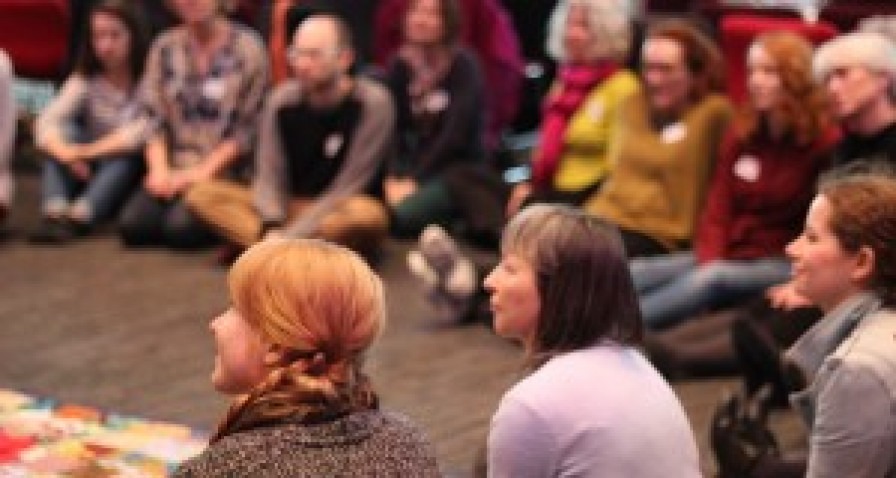Jumping in at the deep end – Arts Council England (ACE) Early Years Music Roundtable

Reflections from Sound Connections’ Interim Programme Manager, Julia Roderick.
There is nothing better when starting a new job to plunge straight in at the deep end and join the conversation, and there was no opportunity more perfect than a Roundtable meeting on Early Years Music hosted by Arts Council England (ACE). Alongside colleagues from across both the arts and early year’s education sectors – libraries, Local Education Authorities, researchers, Bridge Organisations, theatres, museums, nurseries – the group represented diverse viewpoints, extraordinary collective knowledge of the early years sector and a clear shared passion for ensuring all children and young people have access to high quality and inspiring musical education.
Roundtable Chair Laura Gander-Howe (Director: Children, Young People and Learning, ACE) presented a brief summary of the early years policy landscape:
- Focus on early intervention is vital in tacking inequalities in educational attainment and wider social issues; There has been significant Neuro-scientific research into the importance of brain development in the first 1001 days of a child’s life http://www.1001criticaldays.co.uk/
- There is an increasing preoccupation with schools readiness – both skills and personal, emotional and social maturity
- Extension of free childcare to less advantaged 2 year olds – (40% of 2 year olds will have 15 hours of free childcare per week available to them)
- Introduction of free children care of 30 hours per week for working parents
- Reduction of funding for early years provision – closure of children’s centres and maintained nurseries and a shift towards provision for early years children in schools
- Publication of revised EYFS Statutory Framework
Laura went onto say that ACE have recognised that early years provision is still perceived by the sector to be less of a priority in policy and funding, and that social class alongside parental engagement is still the strongest influence in a child’s engagement with arts and culture.
The purpose of this Early Years Music Roundtable meeting it seemed therefore was to kick start a renewed drive for advocacy of early years musical practice across the sector, discuss together the issues of quality, the delivery of early years within the Cultural Education Challenge, and key values and principles.
The first part of the meeting highlighted some grass roots activity taking place in London. Presented by Alison Carter, Early Years Advisory Teacher for London Borough of Barking and Dagenham, we heard about a project that encouraged parents and carers to access cultural opportunities on their ‘patch’ called the ‘Cultural Passport Initiative’. At the heart of this work was the belief that in order to empower early year’s practitioners, parents and carers to unlock their cultural worlds, we need to key into their very own point of reference. This project was therefore an invitation for the adults and children to seek, find and explore ‘culture’ in their own area and document it in a scrap book. With some gentle signposting, the results were fruitful and early stage research suggests the work has longevity beyond Local Education Authority intervention. This highlighted the need for understanding the ‘local context’ and that when delivering project in early years settings, measures should be put in place to ensure longevity. The conversation also drew on the importance and value of children as advocates. If arts and education is the entitlement of all, regardless of social class or parental influence, these good news stories play a huge part in celebrating the value of early year’s arts.
Alison also talked about a piece of work called Active Start Dance Programme – linking health and well- being in early years to music and dance, alongside referencing the Sound Connections Cold Spots project undertaken in 2012.
More information about the London Borough of Barking and Dagenham early year’s education strategy can be found here.
Ruth Churchill Dower presented research undertaken by Early Arts to document the ‘ecology’ of a child; The Early Years Infrastructure. This brilliant resource plainly and visually highlighted the complexity of the environment of a child under the age of 5. Sound Connections hopes to be able to share this resource in due course.
Pepita Hanna from Bridge Organisation Arts Connect discussed the possibility of piloting an arts award for early years, and the use Artsmark as an accreditation for early year’s settings – definitely one to watch.
Further conversation included discussion around:
- Policy – the need to address the Music Education Plan’s current focus on children aged 5+;
- Challenging circumstances – recognition that early years practitioners are often disadvantaged themselves, many are fresh out of college and only have a basic level of literacy and numeracy skills. How can we expect good quality arts engagement when lead teachers are themselves are ‘hard to reach’.
- Progression and joined up thinking – acknowledgement that a joined up approach with health professionals, arts organisations and the education sector at pre-natal stage could be the answer to ensuring that children engage with arts and culture throughout their first years in longer term and meaningful way. There was also agreement from all parties that this longevity can only be achieved through longer term funding programmes.
It is unclear at this stage what the follow up from this meeting might look like, but there was generally a real sense that opening this dialogue with Arts Council England can only mean good things for early year’s music. What is clear is that this was an impassioned and driven cohort of individuals and it was a privilege to represent Sound Connections and the London Early Years Music Network at this meeting.
